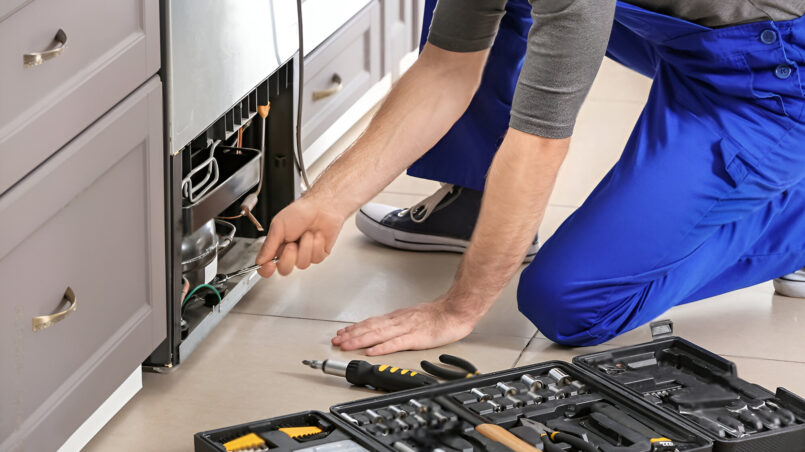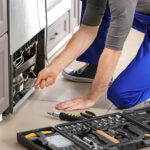Your refrigerator is the unsung hero of your kitchen, working tirelessly to preserve your food and keep your household running smoothly. But when it starts to falter, it can lead to spoiled groceries, costly energy bills, and even health hazards. If you’re noticing unusual behavior from your fridge, it may be time to act fast. Prompt Appliance Repair can make all the difference between a quick fix and a full appliance replacement.
Key Takeaways:
- Strange noises like buzzing, clicking, or humming could signal serious internal issues with the fan or compressor.
- Spoiled food despite low temperature settings points to thermostat or cooling system failures.
- Condensation or frost buildup indicates airflow blockages or a malfunctioning defrost system.
- A hot fridge exterior often means clogged condenser coils or faulty fans, raising energy usage.
- Leaks and water pooling may stem from blocked defrost drains or damaged water lines, needing urgent repair.
Unusual Noises Coming From the Fridge
If your fridge starts making buzzing, clicking, knocking, or whirring noises, this could signal failing components like the evaporator fan, condenser fan, or compressor. A sudden change in sound frequency or loud vibrations is clear red flags that shouldn’t be ignored. Ignoring these auditory warnings often leads to total system failure and expensive replacement costs.
Food Spoiling Quickly Despite Low Settings
One of the clearest signs your fridge is on the brink is if your food is going bad faster than usual, even when the temperature dial is set low. Inconsistent cooling may be caused by a malfunctioning thermostat, failing compressor, or defective door seal. If you’re throwing out milk and produce long before their expiration dates, it’s time to schedule a diagnostic.
Excessive Condensation or Frost Buildup
Water droplets forming inside the fridge or freezer, or excessive frost buildup on the back wall, indicate a problem with temperature regulation or airflow. Damaged door gaskets, blocked vents, or a failing defrost system can compromise the appliance’s performance. This can lead to mold growth, water leakage, or freezing of perishable items in the fridge compartment.
Fridge Exterior Feels Hot to the Touch
A refrigerator should not feel warm or hot on the outside. While the back coils do release heat during normal operation, excess heat on the sides or front could signal issues with the condenser coils or fans. This problem not only shortens the lifespan of the appliance but also causes your energy bills to skyrocket.
Freezer Isn’t Cold Enough
If your freezer fails to maintain a steady freezing temperature, the motor or evaporator coils may be failing. Soft ice cream, thawed meat, or watery ice cubes are major signs of malfunction. A non-freezing freezer is more than just a minor issue—it’s a hazard to food safety.
Constant Motor Cycling
A refrigerator’s motor should cycle on and off in regular intervals. If it runs constantly or for prolonged periods, it may indicate dirty condenser coils, a faulty thermostat, or insufficient ventilation. Prolonged cycling puts strain on the compressor, which could soon lead to total failure.
High Energy Bills
An inefficient refrigerator consumes more power than usual, even when it’s not functioning correctly. If you’ve noticed a recent spike in your electricity bill and can’t explain it, your fridge might be the culprit. Older units or malfunctioning internal components often require more energy to maintain basic functions.
Fridge Light Doesn’t Work
A dead bulb may seem minor, but if the internal light isn’t working and replacing the bulb doesn’t solve the issue, the problem could lie in the switch or internal wiring. While it may seem harmless, electrical malfunctions can worsen and potentially lead to fire risks.
Water Pooling Underneath the Fridge
Water leaks can originate from a clogged or frozen defrost drain, a cracked water supply line, or damaged seals. This can lead to warped flooring, mold issues, and hidden structural damage. Addressing the root cause early with professional appliance repair is essential.
Age of the Refrigerator
Most refrigerators have a lifespan of 10 to 15 years. If your unit is over a decade old and showing signs of malfunction, investing in repair may only provide a short-term solution. Evaluating the cost of repair versus replacement is crucial at this stage.
Why Timely Repair Saves More Than Money
Delaying refrigerator repair does more than put your food at risk—it can stress your home’s electrical system, waste energy, and reduce the appliance’s overall efficiency. Prompt attention from a qualified technician ensures optimal performance, prolongs appliance life, and prevents small issues from becoming major breakdowns.
Trust Expert Technicians for Fast, Reliable Repair
Your refrigerator is too essential to gamble with. Our experienced appliance repair professionals are equipped to diagnose and resolve all fridge issues, from minor part replacements to complex electrical faults. We provide transparent quotes, fast turnaround times, and industry-backed warranties. When your fridge is dying, don’t wait—call a certified repair specialist and restore your kitchen’s heart before it’s too late.
How long should a refrigerator typically last?
Most refrigerators last between 10 to 15 years. If your unit is over 10 years old and frequently malfunctioning, it might be more cost-effective to replace it.
Is it safe to repair a fridge yourself?
While cleaning coils or replacing light bulbs can be DIY-friendly, internal repairs like compressors or wiring should be left to certified technicians to avoid safety hazards.
How can I tell if it’s better to repair or replace my fridge?
If repair costs exceed 50% of the price of a new unit and the fridge is more than 8–10 years old, replacement is usually the smarter option.






